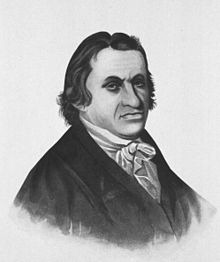Samuel Bard (physician)

Samuel Bard (April 1, 1742 – May 24, 1821) was an American physician. He founded the first medical school in New York. He was a personal physician to George Washington. His description of the disease diphtheria was instrumental in formulating treatment for that condition. He helped found the second medical school in the United States at King's College, now known as Columbia University College of Physicians and Surgeons He is also the grandfather of John Bard, founder of Bard College.
Biography
Bard was born in Philadelphia as the son of John Bard, a physician. He first studied at Columbia College, and in September 1761 sailed to Europe to obtain a thorough medical education. He spent five years in France, England and Scotland and received his MD at the University of Edinburgh in May 1765. On his return, he found his father in debt for his education, which had cost more than a thousand pounds. He entered into partnership with him, and for three years drew nothing beyond his expenses from the profits of the business, amounting to 1500 a year. Having thus honorably discharged this debt, he married his cousin, Mary Bard, to whom he had long been attached.
Bard founded the first hospital in New York called the Hospital in the City of New York in America in 1769. Bard formed the plan of the Medical School of New York, which was published within a year after his return. He was appointed Professor of the Practice of Physics. Medical degrees were first conferred in 1769. In the same year, the hospital was founded by his exertions; but the building was burnt, causing a delay of the establishment until 1791. In the time of the war he left the city, placing his family in the house of his father at Hyde Park; but anxious to provide for his wife and children and to secure his property, in the next year, he returned to New York, while the enemy had possession of it, and engaged in his professional business.
After the return of peace, Washington selected him as his family physician. At this period he lost four out of his six children by scarlatina, which prevailed in a violent form. In consequence of the illness of Mrs. Bard, he withdrew from business for a year, devoting himself to her. In 1784, he returned to the city. Having formed the purpose to retire from business, he in 1798 removed to his seat in the neighborhood of his father at Hyde Park. But, when the yellow fever appeared, he resolutely returned to his post. By his fearless exposure of himself he took the disease; but, nursed by his wife, he recovered. The remaining 23 years of his life were spent in happy retirement, surrounded by his children and grandchildren. In 1813, he was appointed President of the College of Physicians and Surgeons. He died of pleurisy. His wife succumbed of the same disorder the preceding day, and they were buried in one grave.
References
 This article incorporates text from this source, which is in the public domain: Simpson, Henry, 1790–1868 The lives of eminent Philadelphians, now deceased (1859)
This article incorporates text from this source, which is in the public domain: Simpson, Henry, 1790–1868 The lives of eminent Philadelphians, now deceased (1859)- John McVickar (1822), A Domestic Narrative of the Life of Samuel Bard, M. D.: LL. D., Late President of the College of Physicians and Surgeons of the University of the State of New York, &c, Columbia College of Columbia University
Selected Works
- A discourse upon the duties of a physician: with some sentiments, on the usefulness and necessity of a public hospital (1769)
- An enquiry into the nature, cause and cure, of the angina suffocativa, or, sore throat distemper (1771)
- A discourse on medical education (1819)
- A compendium of the theory and practice of midwifery (1819)
